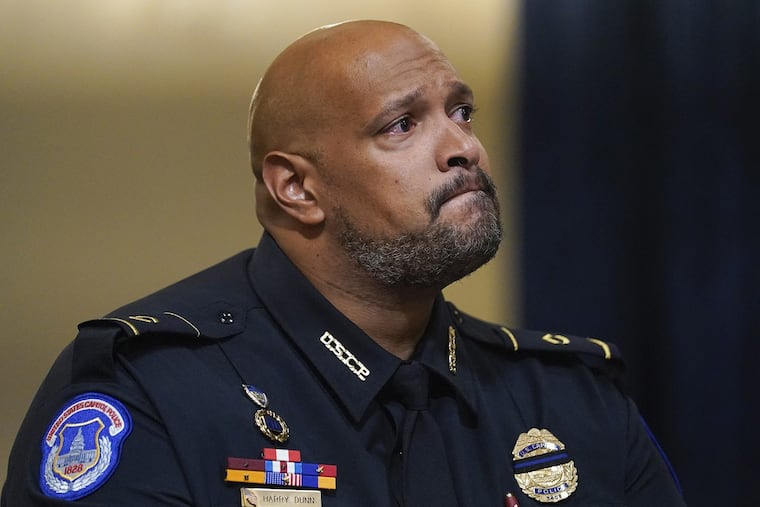How one Capitol police officer’s experience underscores the role of race on Jan. 6 | Solomon Jones
The insurrection was certainly influenced by racial animus. After all, voters of color in key cities had helped to defeat Trump. But for one officer, the racism of that day was far more personal.

While there are times when criticism of American policing is not only warranted but necessary, Jan. 6, 2021, was not such an occasion. On that day, when a traitorous commander in chief turned an armed mob against them, the U.S. Capitol Police stood and fought. They did their jobs.
Yes, one could argue, as I often have, that the officers would have reacted with a barrage of gunfire if the insurrectionists had been Black, but there is no arguing that the Capitol Police, with some assistance from the Washington Metro Police, showed valor that day. Even as law enforcement officers within Trump’s mob flashed badges and fought against them, the men and women who were supposed to guard the Capitol did their jobs, and today they bear the scars to show for it.
Some of their wounds were physical, like the injuries sustained by former Metro Police Officer Michael Fanone, who was beaten on the Capitol steps. Officer Brian Sicknick died the day after fighting Trump’s mob, and though the coroner later declared that Sicknick had succumbed due to natural causes, Sgt. Harry Dunn thought different. That’s why, when he testified before Congress about what he’d endured during the attack, Dunn demanded a moment of silence for Sicknick, whom Dunn said “died from injuries he sustained in the line of duty defending the Capitol of our beloved democracy.”
» READ MORE: Police officers’ ‘restraint’ on Capitol Hill is no victory for a racist America | Solomon Jones
Dunn was one of the heroes of Jan. 6 because he was willing to speak those kinds of truths. But when Dunn began to speak about what he’d endured not only as a police officer but as a Black man, there was pushback. There was consternation. There was fear. The blue wall of silence had been broken, and according to the New York Times, Dunn’s fellow officers were offended. They thought Dunn was making it “all about race.”
Therein lies the problem. Whenever Black people share their experiences about racism, there are those who make it an all-or-nothing proposition. Jan. 6 was certainly influenced by racial animus. After all, voters of color in key cities had helped to defeat Donald Trump in swing states like Pennsylvania, Michigan, Wisconsin, and Georgia. So, when Trump incessantly repeated the lie that he’d really won the election, his mostly white mob was enraged, and I believe that rage was exacerbated by images of Black people counting votes in the states Trump lost.
For Dunn, though, the racism of Jan. 6 was more personal, because for the insurrectionists marching on the Capitol that day, Dunn represented those who’d supposedly stolen the election. While white officers faced the physical violence of a mob bent on overturning Democracy, Dunn faced the emotional violence of racists attempting to turn back the hands of time.
Dunn is not a small man. He’s the size of an NFL lineman, but when he testified about the hate Trump’s mostly white mob subjected him to, he grew teary-eyed.
» READ MORE: Where is the FOP when it comes to supporting police officers hurt on Jan. 6? | Solomon Jones
Dunn told Congress that as he stood on the Capitol grounds on Jan. 6, someone in the crowd said no one had voted for Joe Biden.
“I voted for Joe Biden,” Dunn replied. “Does my vote not count? Am I nobody?”
The mob jeered Dunn and someone in the crowd twice referred to him using a racial slur.
Dunn made it through the day. Then he cried about it. That was his testimony before Congress. That’s what he said in media interviews because that’s what he experienced.
For any Black person who has ever spoken up about racism, the reaction of Dunn’s colleagues was predictable. Of course, they ignored the nuance of Dunn’s testimony and tried to reduce him to someone who was making it “all about race.”
But that’s not what Dunn was doing. He was telling the truth. And the truth is, an overwhelmingly white mob descended on the Capitol to try to nullify Black votes. The truth is, they were sent there by a lying ex-president who was willing to go to any lengths to hold onto power. The truth is, what they did that day was a crime, and until America is willing to face that truth, we’ll never become the country we claim to be.